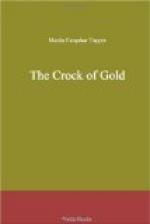Such an advocate was Mr. Grantly, a barrister of talents and experience, who, from motives of the purest benevolence, did all that in him lay for Roger Acton. In one thing, however, and that of no small import, the kindly cautious man of law had contrived to do more harm than good: for, after having secretly made every effort, but in vain, to find Ben Burke as a witness—and after having heard that the aforesaid Ben was a notorious poacher, and only intimate at Hurstley with Acton and his family—he strongly recommended Roger to say nothing about the man or his adventure, as the acknowledgment of such an intimacy would only damage his cause: all that need appear was, that he found the crock in his garden, never mind how he “thought” it got there: poachers are not much in the habit of flinging away pots of gold, and no jury would believe but that the ill-reputed personage in question was an accomplice in the murder, and had shared the spoil with his friend Roger Acton. All this was very shrewd; and well meant; but was not so wise, for all that, as simple truth would have been: nevertheless, Roger acquiesced in it, for a better reason than Mr. Grantly’s—namely, this: his feelings toward poor Ben had undergone an amiable revulsion, and, well aware how the whole neigbourhood were prejudiced against him for his freebooting propensities, he feared to get his good rough friend into trouble if he mentioned his nocturnal fishing at Pike island; especially when he considered that little red Savings’ Bank, which, though innocent as to the getting, was questionable as to the rights of spending, and that, really, if he involved the professed poacher in this mysterious affair, he might put his liberty or life into very serious jeopardy. On this account, then, which Grace could not entirely find fault with (though she liked nothing that savoured of concealment), Roger Acton agreed to abide by Mr. Grantly’s advice; and thus he never alluded to his connexion with the poacher.
Enlightened as we are, and intimate with all the hidden secrets of the story, we may be astonished to hear that, notwithstanding all Mr. Grantly’s ingenuity, and all the siftings of cross-questioners, the case was clear as light against poor Acton. No alibi, he lived upon the spot. No witnesses to character; for Roger’s late excesses had wiped away all former good report: kind Mr. Evans himself, with tears in his eyes, acknowledged sadly that Acton had once been a regular church-goer, a frequent communicant: but had fallen off of late, poor fellow! And then, in spite of protestations to the contrary, behold! the corpus delicti—that unlucky crock of gold, actually in the man’s possession, and the fragment of shawl—was not that sufficient?




